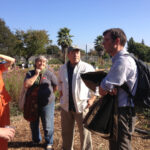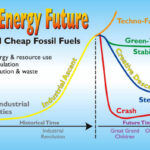Social Enterprise
The concept of “social enterprise” has been gathering traction in the U.S. It’s kind of like a hybrid of the business world and the nonprofit world.
In its most basic form, there’s the example of a gift store within a museum: the profits from the store fund the social cause of the museum. In more complex forms, there are micro-loan businesses that fund third-world startups, bakeries that employ at-risk workers, and a myriad of creative examples.
In the UK, the REconomy project is taking this concept a step further, to ask “What might a social enterprise founded on Transition principles be like?” What might the “social enterprise” model be like if it were founded around the types of business we need for a localized, post-petroleum, leaner economy world?
The UK group has begun identifying certain characteristics which they feel are essential to such an enterprise. These characteristics include co-ownership, democracy, and reinvestment of the profits into the local community.
What is a Transition Enterprise?
1) Resilience outcome. Will benefit the local community by improving its resilience or wellbeing in some way
2) Low Carbon. Minimizes carbon emissions and thus contribution to climate change
3) Natural Limits. Works within the natural resource (and energy) limits of the planet, including ecosystem services. Works with suppliers that do the same.
4) Appropriate Localization. Considers viability of business model post peak oil, and level of independence from globalized corporate macro-economy and its risks.
5) Not just for personal profit. Goes beyond distributing profit to individuals, with at least some profits reinvested in the local community.
6) Community assets. Holding public or “commons” assets and wealth in trust for community benefit (can’t be sold by individuals).
7) Locally accountable. Independent and accountable to a defined constituency who are democratically involved in governance of enterprise(Thoughts from the UK’s REconomy project)
Social enterprise thus becomes: the business model of the future (i.e. conscious); a way of financing social causes (via “business” profits); a way of holding community assets or “investing” (The Commons; co-ownership); a way of regulating business and investment (democracy).
Here in L.A. we have begun exploring the question as well. One of our working group participants introduced the model of the Mondragon Cooperative Complex. This Spanish model could inform and enrich the UK ideas. Specifically:
Mondragon’s limits on income disparity between the highest paid executive and the lowest paid worker could help define the UK’s bar on personal profit (REconomy’s bullet #5).
Mondragon’s integrated educational element informs the UK’s appropriate localization (REconomy’s bullet #4) by studies and, by virtue of its being integrated, provides a continuous supply of appropriately trained workers to meet local needs. Additionally it provides local retraining as the progression of this transition era phases out some local needs and offers new ones.
Mondragon’s integrated banking supports the UK’s concept of community assets (REconomy’s bullet #6). And Mondragon’s integration into a wider network – a cooperative complex – keeps the UK’s local accountability (REconomy’s bullet #7) from becoming elitist. It introduces a broader, area-wide perspective into the democracy.
Social enterprise
- Hopkins social enterprise ingredient and comments on “Social Enterprise in Action” event in Totnes
- Characteristics of a Transition Enterprise, as posed by the UK’s REconomy project
- Mission, Inc.: The Practitioners Guide to Social Enterprise (Social Venture Network) by Kevin Lynch and Julius Walls
- The Social Entrepreneur’s Handbook: How to Start, Build, and Run a Business That Improves the World by Rupert Scofield
- To Build The Life You Want – Create The Work You Love – The Spiritual Dimension of Entrepreneuring by Marsha Sinetar
- A blog about social enterprise by consultant Rolfe Larson, which seems to be based here in the U.S. It includes a recent post on some of the legal & tax implications within the U.S. tax structure.
- Notes from Transition L.A.’s Transition Enterprise working group


